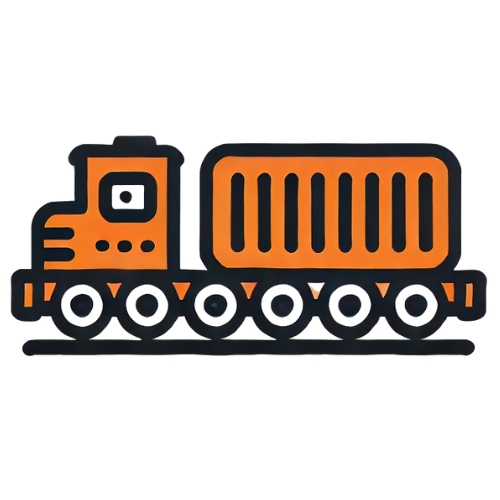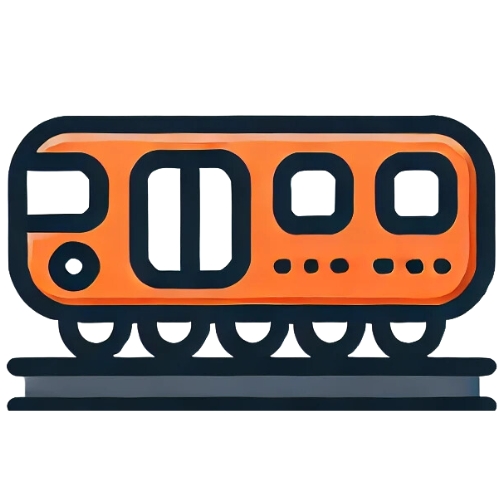
If you’re looking for a career in the transport industry in South Africa, becoming a train driver may be an attractive option. With demand for railway transportation rising year on year, the role of a train driver is increasingly important. But what kind of salary can you expect in this profession?
Key Takeaways
- Salary Range: Train drivers in South Africa earn between R150,000 and R500,000 annually, with an average salary of about R290,000. Factors influencing pay include experience, location, and the type of employer.
- Requirements and Training: Becoming a train driver requires a high school diploma, specific training, a valid driver’s license, and passing medical and drug tests. Essential skills include good communication, problem-solving, and attention to detail.
- Job Benefits and Conditions: Train drivers often work long hours in shifts, including nights and weekends. Benefits include medical aid, pension funds, and potentially free travel for the driver and their family.
About Arcadia Finance
Obtain your loan effortlessly through Arcadia Finance. Application is free, and you have the choice to select from a range of 19 reputable lenders. Each lender follows the regulations established by the National Credit Regulator in South Africa.
Overview of Train Driver Salaries in South Africa
Train driver salaries in South Africa vary depending on a range of factors, such as the type of train driver, employer, location and level of experience. On average, a train driver in South Africa earns around R290,000 per year. However, the salary can range from about R150,000 to over R500,000 per annum.
Being a train driver is not just a job, it’s a lifestyle. Train drivers are responsible for transporting people and goods across South Africa’s vast and diverse landscape. They operate trains that carry everything from coal to commuters, and they work in all kinds of weather and at all times of the day and night.
Factors Influencing Train Driver Salaries
The main factors influencing train driver salaries in South Africa include:
- Experience: The more years of experience a train driver has, the higher their salary is likely to be. Experienced train drivers are in high demand, and they can earn top salaries.
- Location: Train drivers working in metropolitan areas often earn higher salaries than those working in rural areas. This is because there is more demand for their services in urban areas, and the cost of living is generally higher in cities.
- Employer: Train drivers working for government-owned railway corporations generally earn more than those working for private rail companies, such as mining companies. This is because government-owned corporations often have better funding and can offer better benefits and job security.
Despite the challenges of the job, many train drivers find it to be a rewarding career. They enjoy the freedom of the open road and the satisfaction of knowing that they are helping to keep South Africa’s economy moving.
Comparing Train Driver Salaries to Other Professions
When compared to other professions in South Africa, train drivers earn a competitive salary. For instance, a train driver earns more than a teacher, a nurse or a police officer, but less than a doctor, an engineer or a lawyer. However, train drivers often have better job security and benefits than many other professions.
Overall, being a train driver in South Africa can be a challenging but rewarding career. With the right experience and qualifications, train drivers can earn a good salary and enjoy a stable and fulfilling career.
Considering a career change? You might want to explore some work from home opportunities in South Africa. With the increasing flexibility in the job market, finding remote jobs can provide a perfect balance of work and life.

Requirements to Become a Train Driver in South Africa
Educational Qualifications
To become a train driver in South Africa, candidates are typically required to have a high school diploma or equivalent qualification. This is because train driving requires a good level of literacy and numeracy skills, as well as the ability to read and understand complex instructions. However, some companies may specify additional qualifications, such as a diploma in transport or logistics, to give candidates an edge in the competitive job market.
It’s important to note that train driving is a highly regulated profession, and candidates must meet strict criteria to be considered for employment. This is because train drivers are responsible for the safety of passengers and goods, and must be able to operate trains safely and efficiently.
Training and Certification
Once candidates have met the educational requirements, they must undergo a period of training to qualify as train drivers. This usually involves classroom-based training, as well as on-the-job training. During this training, candidates will learn about the technical aspects of train driving, such as how to operate the train’s controls, how to read signals and signs, and how to communicate with other train drivers and rail staff.
In addition to technical training, train drivers also require a valid driver’s license, and must pass a medical examination and drug test. This is because train driving can be physically demanding, and train drivers must be in good health to perform their duties safely.
Necessary Skills and Experience
In addition to the educational and training requirements, train drivers need to have a range of skills and experience to carry out their duties effectively. These include good communication skills, the ability to work well under pressure, good eyesight and hearing, and excellent attention to detail.
Train drivers also need to have good problem-solving skills, as they may need to make quick decisions in unexpected situations. They must be able to remain calm and focused in emergencies, and be able to follow protocols and procedures to ensure the safety of passengers and goods.
Finally, train drivers need to be able to work well in a team, as they will often work with other train drivers and rail staff to ensure the smooth running of train services. They must be able to communicate effectively with others, and be willing to take direction from their superiors.
Different Types of Train Drivers and Their Salaries
South Africa has a rich history of railway transportation, with trains being a popular mode of transport for both passengers and goods. Train drivers are an essential part of the railway industry, responsible for ensuring that trains run smoothly and safely. In this article, we will explore the different types of train drivers and their salaries.

Passenger Train Drivers
Passenger train drivers are responsible for transporting passengers across South Africa’s railway networks. They operate trains that run on both short and long distances, ensuring that passengers reach their destinations safely and on time. The job of a passenger train driver requires excellent driving skills, as well as the ability to communicate effectively with passengers and other railway staff.
Passenger train drivers typically earn salaries ranging from R200,000 to R500,000 per year, depending on the employer and location. Some of the factors that influence the salary of passenger train drivers include their level of experience, the type of train they operate, and the location of the railway network.

Freight Train Drivers
Freight train drivers transport goods across the country, such as coal, iron ore, and other minerals. They play a crucial role in the economy, as they ensure that goods are transported safely and efficiently. The job of a freight train driver requires excellent driving skills, as well as the ability to handle heavy machinery and cargo.
Freight train drivers earn salaries ranging from R150,000 to R450,000 per year, depending on the employer and location. Some of the factors that influence the salary of freight train drivers include their level of experience, the type of cargo they transport, and the location of the railway network.

Suburban Train Drivers
Suburban train drivers operate trains on a local or regional level, transporting commuters to and from work or school. They play a crucial role in the daily lives of many South Africans, ensuring that they reach their destinations safely and on time. The job of a suburban train driver requires excellent driving skills, as well as the ability to communicate effectively with commuters and other railway staff.
Suburban train drivers usually earn salaries ranging from R250,000 to R550,000 per year, depending on the employer and location. Some of the factors that influence the salary of suburban train drivers include their level of experience, the number of hours they work, and the location of the railway network.
» Read more: How much do welders really earn?

Working Conditions and Benefits for Train Drivers
Shift Patterns and Hours
Train drivers are a vital part of the railway system, responsible for safely transporting passengers and goods across the country. They typically work in shifts, which can include weekends and public holidays. The nature of their work means that they may work long hours, with some shifts lasting up to 12 hours. However, some employers offer flexible working hours or part-time employment, which can be a great benefit for those who need to balance work with other responsibilities.
Despite the long hours, train drivers have the opportunity to see some of the most beautiful landscapes in the country. From the rolling hills of the countryside to the bustling cityscapes, train drivers get to experience it all from the comfort of their cab.
Health and Safety Considerations
Train drivers are responsible for the safety of their passengers, as well as the safety of other workers on the railways. They must adhere to strict safety regulations to ensure that they and their passengers are not put at risk. This means that train drivers must be vigilant, alert, and able to react quickly in the event of an emergency.
Working as a train driver can be a stressful job, as the responsibility of the safety of passengers and other workers rests on their shoulders. However, with proper training and support, train drivers can feel confident in their ability to handle any situation that may arise.
Employee Benefits and Perks
In addition to the satisfaction of knowing that they are providing a vital service to the country, train drivers often receive benefits such as medical aid, pension funds, and bonuses for working unsocial hours or overtime. Some companies also offer free train travel to train drivers and their families, allowing them to explore the country and spend time with loved ones.
Working as a train driver can be a rewarding career, with opportunities for advancement and personal growth. With the right training and support, train drivers can enjoy a fulfilling career that allows them to see the country and make a difference in the lives of others.
When planning your career, it’s beneficial to compare your potential earnings with those in other fields. For example, the electrical engineer salary offers insights into the financial rewards and job stability in engineering.
Conclusion
Becoming a train driver in South Africa can be a rewarding career, both financially and emotionally. The salary range for train drivers is competitive, and the job offers a range of benefits and perks. However, the job can be demanding, and train drivers need to have a range of skills and qualifications to carry out their duties effectively. If you’re interested in a career in the transport industry, becoming a train driver is certainly worth considering.
Frequently Asked Questions
Train drivers in South Africa earn between R150,000 and R500,000 annually, depending on experience, location, and type of employer. The average salary is about R290,000 per year.
The highest salary for a train driver in South Africa can reach up to R500,000 annually, typically earned by those with extensive experience or working for major companies in larger cities.
To become a train driver in South Africa, one needs a high school diploma, specific vocational training, a valid driver’s license, and must pass medical and drug tests. Key skills include communication, problem-solving, and attention to detail.
Yes, train drivers often receive benefits such as medical aid, pension funds, and sometimes free travel for themselves and their families. The exact benefits can vary based on the employer.
Train drivers typically work long hours, including night and weekend shifts. The job requires high levels of concentration and adherence to safety protocols, often in varying weather conditions.
Fast, uncomplicated, and trustworthy loan comparisons
At Arcadia Finance, you can compare loan offers from multiple lenders with no obligation and free of charge. Get a clear overview of your options and choose the best deal for you.
Fill out our form today to easily compare interest rates from 19 banks and find the right loan for you.


